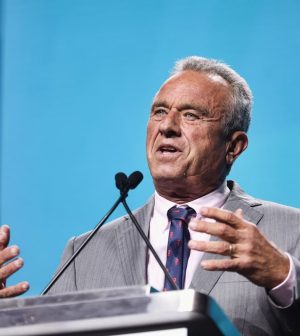- Could Your Grocery Store Meat Be Causing Recurring UTIs?
- Are You Making This Expensive Thermostat Error This Winter?
- Recognizing the Signs of Hypothyroidism
- 10 Strategies to Overcome Insomnia
- Could Artificial Sweeteners Be Aging the Brain Faster?
- Techniques for Soothing Your Nervous System
- Does the Water in Your House Smell Funny? Here’s Why
- Can a Daily Dose of Apple Cider Vinegar Actually Aid Weight Loss?
- 6 Health Beverages That Can Actually Spike Your Blood Sugar
- Treatment Options for Social Anxiety Disorder
Trump Picks Vaccine Skeptic Robert F. Kennedy Jr. to Lead Health & Human Services

In a move guaranteed to alarm many, President-elect Donald Trump has chosen Robert F. Kennedy Jr., a vocal opponent of vaccines and other tenets of mainstream health care, to head the massive U.S. Department of Health and Human Services (HHS).
The department encompasses numerous key agencies, including the U.S. Centers for Disease Control and Prevention, the U.S. Food and Drug Administration, the National Institutes of Health, Medicaid and Medicare.
Trump’s nomination, which came Thursday, shifts the 70-year-old Kennedy from a fringe character railing against many long-accepted medical practices to one of the most powerful people in the federal government, charged with overseeing Americans’ health care and safety.
In a statement, Trump, who has already said he’d let Kennedy “go wild on health,” reinforced his would-be appointee’s image as a maverick.
“For too long, Americans have been crushed by the industrial food complex and drug companies who have engaged in deception, misinformation and disinformation when it comes to Public Health,” Trump said in a post on his Truth Social site announcing the nomination. Kennedy, he said, would “Make America Great and Healthy Again!”
It’s been a dramatic arc for Kennedy, whose namesake father was assassinated in 1968 in the midst of a campaign to become the Democratic Presidential nominee that year.
Kennedy Jr. was himself a Democrat until he campaigned in this year’s presidential campaign as an independent focused on health care. But he abandoned the race after receiving a pledge from the Republican Trump that he’d be given a high-ranking position in health policy should Trump return to power.
It’s Kennedy’s many controversial positions on various aspects of health that have made him a target of critics.
He’s long vociferously claimed that the COVID-19 vaccines employed during the pandemic caused more harm than good — a claim not borne out by science, most experts say.
He’s also touted the long-discredited notion that childhood vaccines can cause autism.
According to the Associated Press, his views on vaccines could make Kennedy’s confirmation by Congress difficult, even in a GOP-controlled Senate.
He’s also a supporter of the safety of raw, unpasteurized milk (long linked to outbreaks of illness) and an opponent of fluoride in drinking water, something that for decades has been a mainstay of dental health.
Kennedy has long cast himself as a fighter against Big Pharma and food conglomerates, something that may have bolstered Trump’s appeal among voting blocks such as young mothers, the AP noted.
As such, Kennedy has pushed for tougher regulation of the food and drug industry, which could be at odds with Republicans’ promises of deregulation in a second Trump term.
What making Kennedy the head of HHS might mean for the more than 80,000 people employed there remains to be seen.
As reported Thursday by NBC News, unnamed insiders with knowledge of the mood within the HHS said that “dozens” of top officials may be considering quitting if Kennedy’s appointment is confirmed.
SOURCES: Associated Press, NBC News
Source: HealthDay
Copyright © 2026 HealthDay. All rights reserved.










